Networking science.
Swiss Academies Series
All-day childcare and schooling

This report analyses the attitudes of parents in Switzerland regarding all-day childcare, based on data collected from an online panel of 2,161 parents. Providing high-quality childcare is essential for child development, equal educational opportunities, and increasing female participation in the workforce, all of which contribute to Switzerland’s economic sustainability. The analyses presented in this report are based on primary data covering various aspects of general parental attitudes towards all-day schooling, contrasted with specific views on the own family. They differentiated between German- and French-speaking parents to shed more light on potential regional differences.
Duchêne, Cédric, Marieke Heers and Laura Bernardi (2025): All-day childcare and schooling. A survey of parental attitudes in Switzerland, ed. by the Swiss Academy of Humanities and Social Sciences (Swiss Academies Reports 20,1).
Biology Community Roadmap 2024
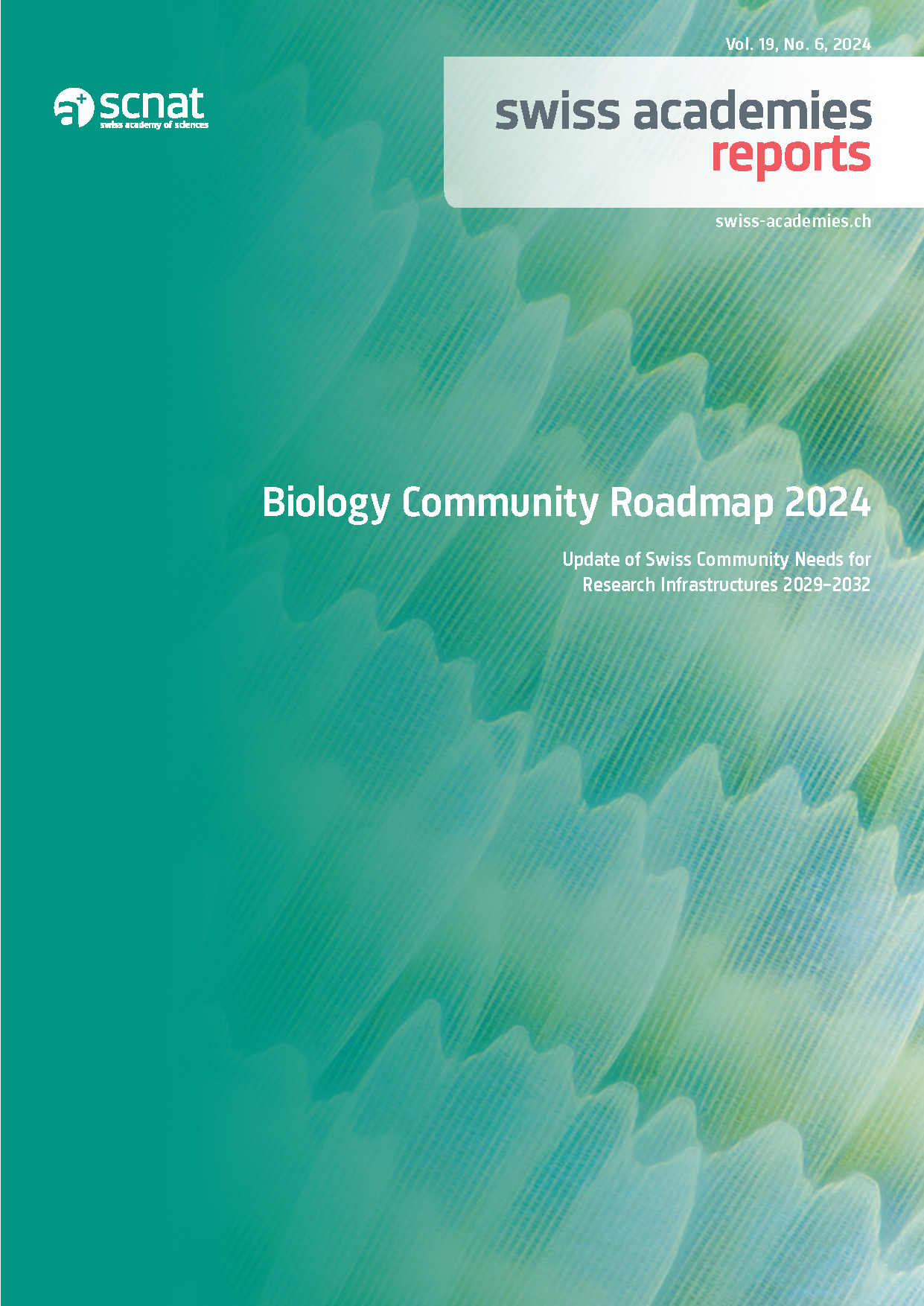
Update of Swiss Community Needs for Research Infrastructures 2029-2032
This document is an update to the Biology Community Roadmap published in 2021. It presents the needs of the Swiss biology community in terms of future national and international research infrastructures.
Together with similar Community Roadmaps in other disciplines, it is an element of the four-year process leading to the development of the Swiss Roadmap for Research Infrastructures 2027 to be written by the State Secretariat for Education, Research and Innovation (SERI) in view of the ERI Dispatch 2029–2032 to the Federal Council. The role of these ‘bottom-up’ inputs is to serve as an important basis for the strategic planning of the higher education institutions on new or major upgrades to national infrastructures and to inform and support SERI during its decision-making process on Swiss participation in international research infrastructure networks and organisations.
Alvarez N, Bruggmann R, Buchmann N, Dessimoz C, Faso C, Hofmann S, Uhlmann V (2024)
Biology Community Roadmap 2024. Update of Swiss Community Needs for Research Infrastructures 2029-2032.
Swiss Academies Reports 19 (6)
Chemistry Community Roadmap 2024
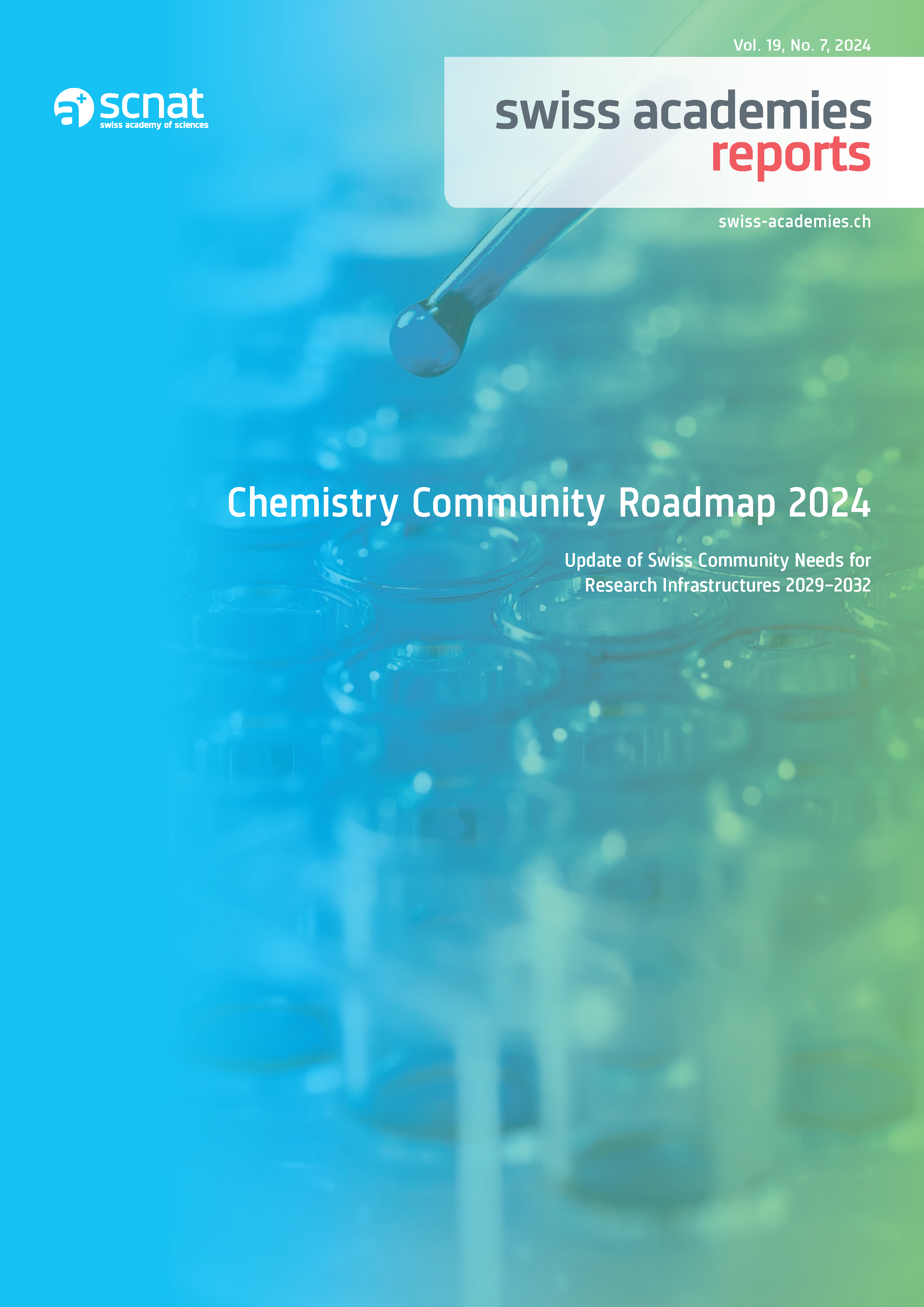
Update of Swiss Community Needs for Research Infrastructures 2029-2032
This document is an update to the Chemistry Community Roadmap published in 2021. It presents the needs of the Swiss chemistry community in terms of future national and international research infrastructures.
Together with similar Community Roadmaps in other disciplines, it is an element of the four-year process leading to the development of the Swiss Roadmap for Research Infrastructures 2027 to be written by the State Secretariat for Education, Research and Innovation (SERI) in view of the ERI Dispatch 2029–2032 to the Federal Council. The role of these ‘bottom-up’ inputs is to serve as an important basis for the strategic planning of the higher education institutions on new or major upgrades to national infrastructures and to inform and support SERI during its decision-making process on Swiss participation in international research infrastructure networks and organisations.
Buller R, Copéret C, Emsley L, Nevado C, Hofmann S (2024)
Chemistry Community Roadmap 2024. Update of Swiss Community Needs for Research Infrastructures 2029-2032.
Swiss Academies Reports 19 (7)
Geosciences Community Roadmap 2024
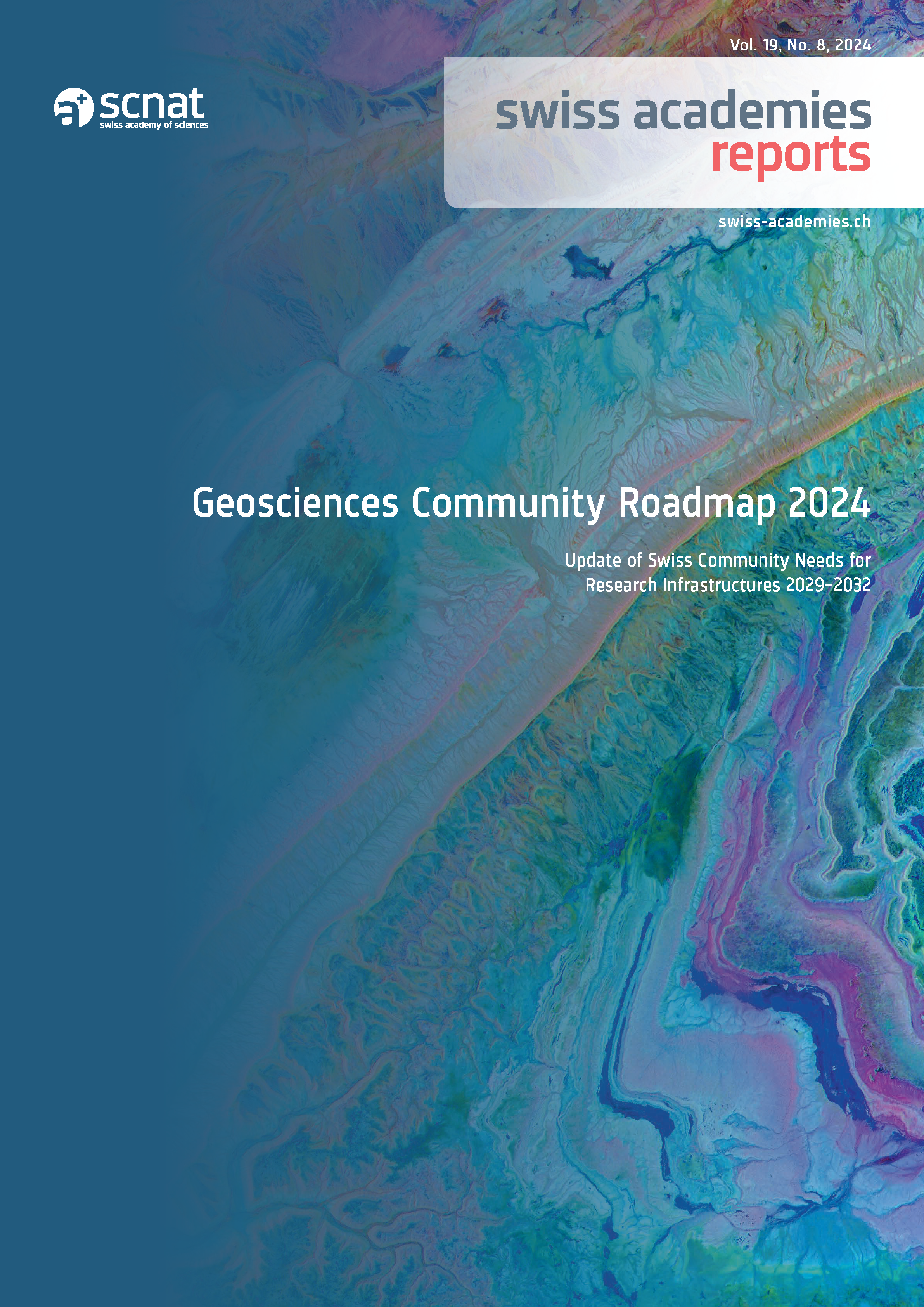
Update of Swiss Community Needs for Research Infrastructures 2029-2032
This document is an update to the Geosciences Community Roadmap published in 2021. It presents the needs of the Swiss geosciences community in terms of future national and international research infrastructures.
Together with similar Community Roadmaps in other disciplines, it is an element of the four-year process leading to the development of the Swiss Roadmap for Research Infrastructures 2027 to be written by the State Secretariat for Education, Research and Innovation (SERI) in view of the ERI Dispatch 2029–2032 to the Federal Council. The role of these ‘bottom-up’ inputs is to serve as an important basis for the strategic planning of the higher education institutions on new or major upgrades to national infrastructures and to inform and support SERI during its decision-making process on Swiss participation in international research infrastructure networks and organisations.
Bachmann O, Foubert A, Dèzes P, Hetényi G, Jäggi A, Müntener O, Reymond C, Roeoesli C, Rubatto D,
Soja B, Steinbacher M, Vogel H, Zeyen N (2024)
Geosciences Community Roadmap 2024. Update of Swiss Community Needs for Research Infrastructures 2029–2032. Swiss Academies Reports 19 (8)
CHIPP Community Roadmap 2024
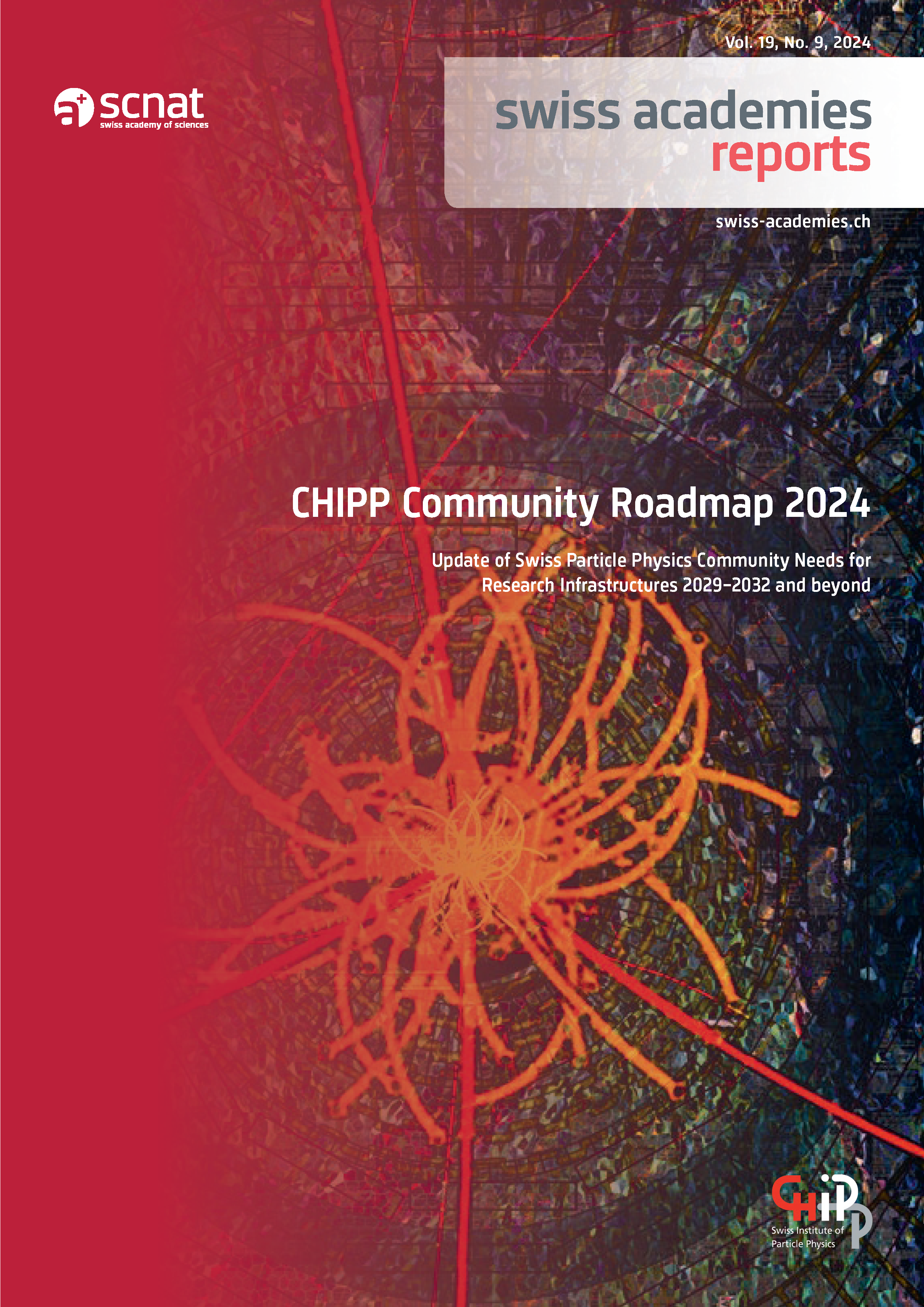
Update of Swiss Particle Physics Community Needs for Research Infrastructures 2029-2032 and beyond
This document is an update to the ‘CHIPP Roadmap for Research and Infrastructure 2025-2028 and beyond’ that was published in 2021. It presents the needs of the Swiss particle and astroparticle physics community in terms of future national and international research infrastructures. The content of the previous roadmap can serve as a reference and provides detailed context for the updates within this document.
Together with similar community roadmaps in other disciplines, it is an element of the four-year process leading to the development of the Swiss Roadmap for Research Infrastructures 2027 to be written by the State Secretariat for Education, Research and Innovation (SERI) in view of the ERI Dispatch 2029–2032 to Federal Council. The role of these ‘bottom-up’ inputs is to serve as an important basis for the strategic planning of the higher education institutions on new or major upgrades to national infrastructures and to inform and support SERI during its decision-making process on Swiss participation in international research infrastructure networks and organisations.
Kilminster B, Crivelli P, Dissertori G, Golling T, Isidori G, Montaruli T, Müller K, Seidel M, Sgalaberna D, Spira M,
Weber M, Benelli A (2024)
CHIPP Community Roadmap 2024. Update of Swiss Particle Physics Community Needs for Research Infrastructures 2029-2032 and beyond.
Swiss Academies Reports 19 (9)
Astronomy Community Roadmap 2024
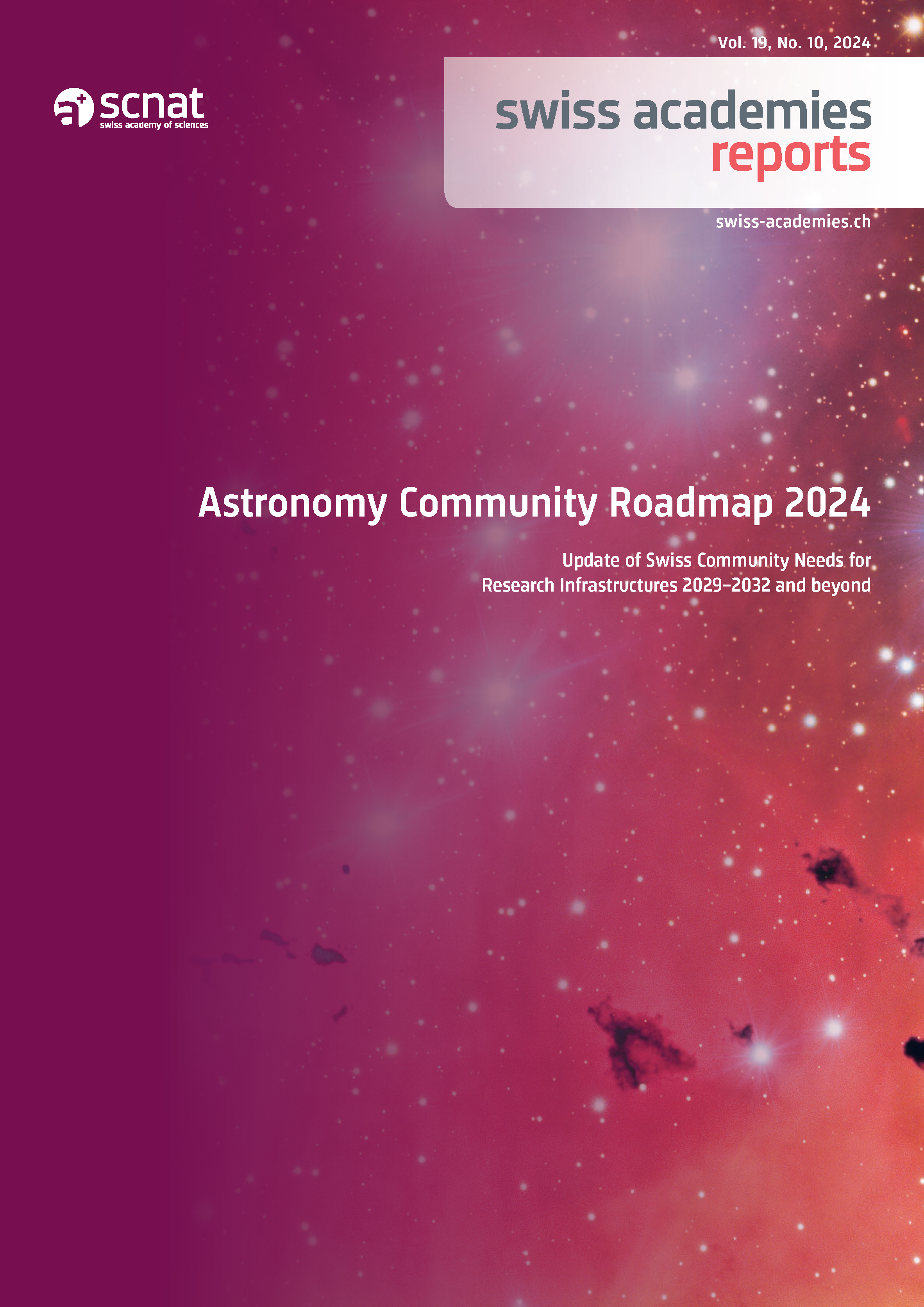
Update of Swiss Community Needs for Research Infrastructures 2029-2032 and beyond
This document is an update to the Astronomy Community Roadmap published in March 2022. It presents the needs of the Swiss astronomy and astrophysics community in terms of future national and international research infrastructures.
Together with similar Community Roadmaps in other disciplines, it is an element of the four-year process leading to the development of the Swiss Roadmap for Research Infrastructures 2027 to be written by the State Secretariat for Education, Research and Innovation (SERI) in view of the ERI Dispatch 2029–2032 to the Federal Council. The role of these ‘bottom-up’ inputs is to serve as an important basis for the strategic planning of the higher education institutions on new or major upgrades to national infrastructures and to inform and support SERI during its decision-making process on Swiss participation in international research infrastructure networks and organisations.
Jetzer P, Berdyugina S, Mordasini C, Paltani S, Pepe F, Refregier A et al. (2024)
Astronomy Community Roadmap 2024. Update of Swiss Community Needs for Research Infrastructures 2029-2032 and beyond.
Swiss Academies Reports 19 (10)
Photon Science Community Roadmap 2024
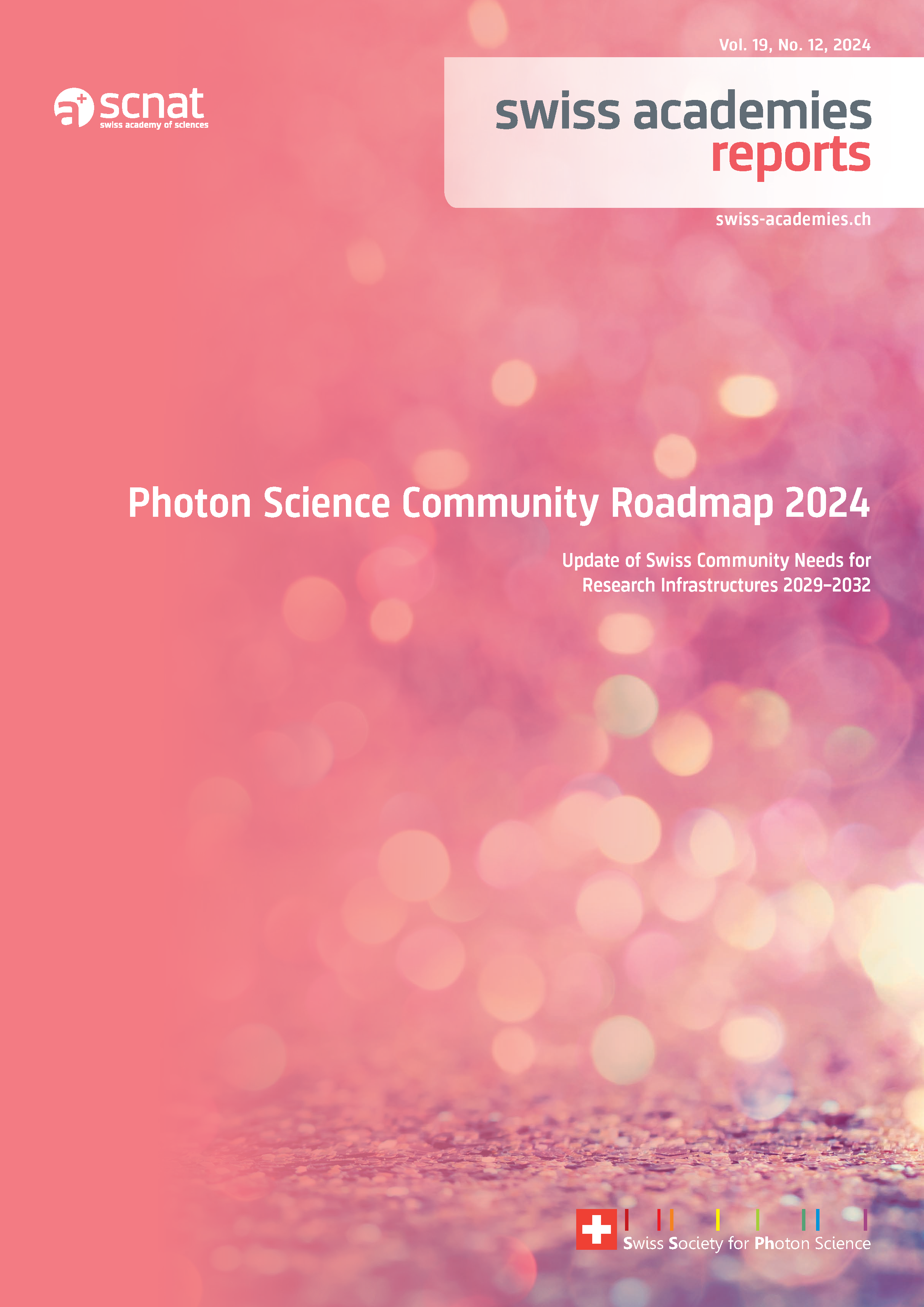
Update of Swiss Community Needs for Research Infrastructures 2029-2032
This document is an update to the Photon Science Community Roadmap published in 2021. It presents the needs of the Swiss photon science community in terms of future national and international research infrastructures.
Together with similar Community Roadmaps in other disciplines, it is an element of the four-year process leading to the development of the Swiss Roadmap for Research Infrastructures 2027 to be written by the State Secretariat for Education, Research and Innovation (SERI) in view of the ERI Dispatch 2029–2032 to the Federal Council. The role of these ‘bottom-up’ inputs is to serve as an important basis for the strategic planning of the higher education institutions on new or major upgrades to national infrastructures and to inform and support SERI during its decision-making process on Swiss participation in international research infrastructure networks and organisations.
Abreu E, Bostedt C, Cavalieri A, Gallmann L, Rupp D, Staub U (2024)
Photon Science Community Roadmap 2024. Update of Swiss Community Needs for Research Infrastructures 2029-2032.
Swiss Academies Reports 19 (12)
Neutron Science Community Roadmap 2024
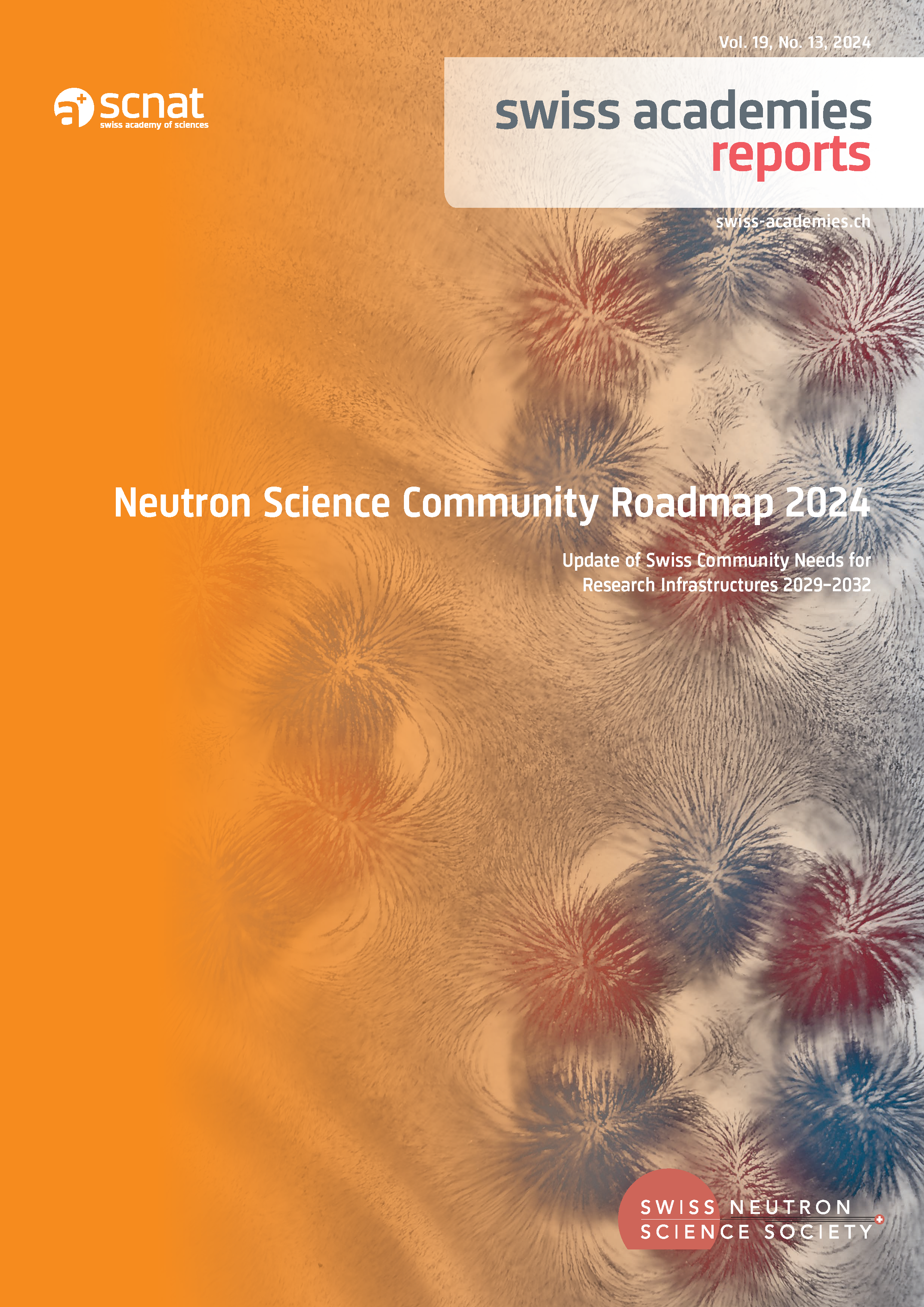
Update of Swiss Community Needs for Research Infrastructures 2029-2032
This document is an update to the Neutron Science Community Roadmap published in 2021. It presents the needs of the Swiss neutron science community in terms of future national and international research infrastructures.
Together with similar Community Roadmaps in other disciplines, it is an element of the four-year process leading to the development of the Swiss Roadmap for Research Infrastructures 2027 to be written by the State Secretariat for Education, Research and Innovation (SERI) in view of the ERI Dispatch 2029–2032 to the Federal Council. The role of these ‘bottom-up’ inputs is to serve as an important basis for the strategic planning of the higher education institutions on new or major upgrades to national infrastructures and to inform and support SERI during its decision-making process on Swiss participation in international research infrastructure networks and organisations.
Janoschek M, Juranyi F, Piegsa F, Sibille R, Strobl M, Lütz-Bueno V (2024)
Neutron Science Community Roadmap 2024. Update of Swiss Community Needs for Research Infrastructures 2029-2032.
Swiss Academies Reports 19 (13)
Grosse Risiken und offene Fragen bei der Veränderung der Sonneneinstrahlung als Klimamassnahme
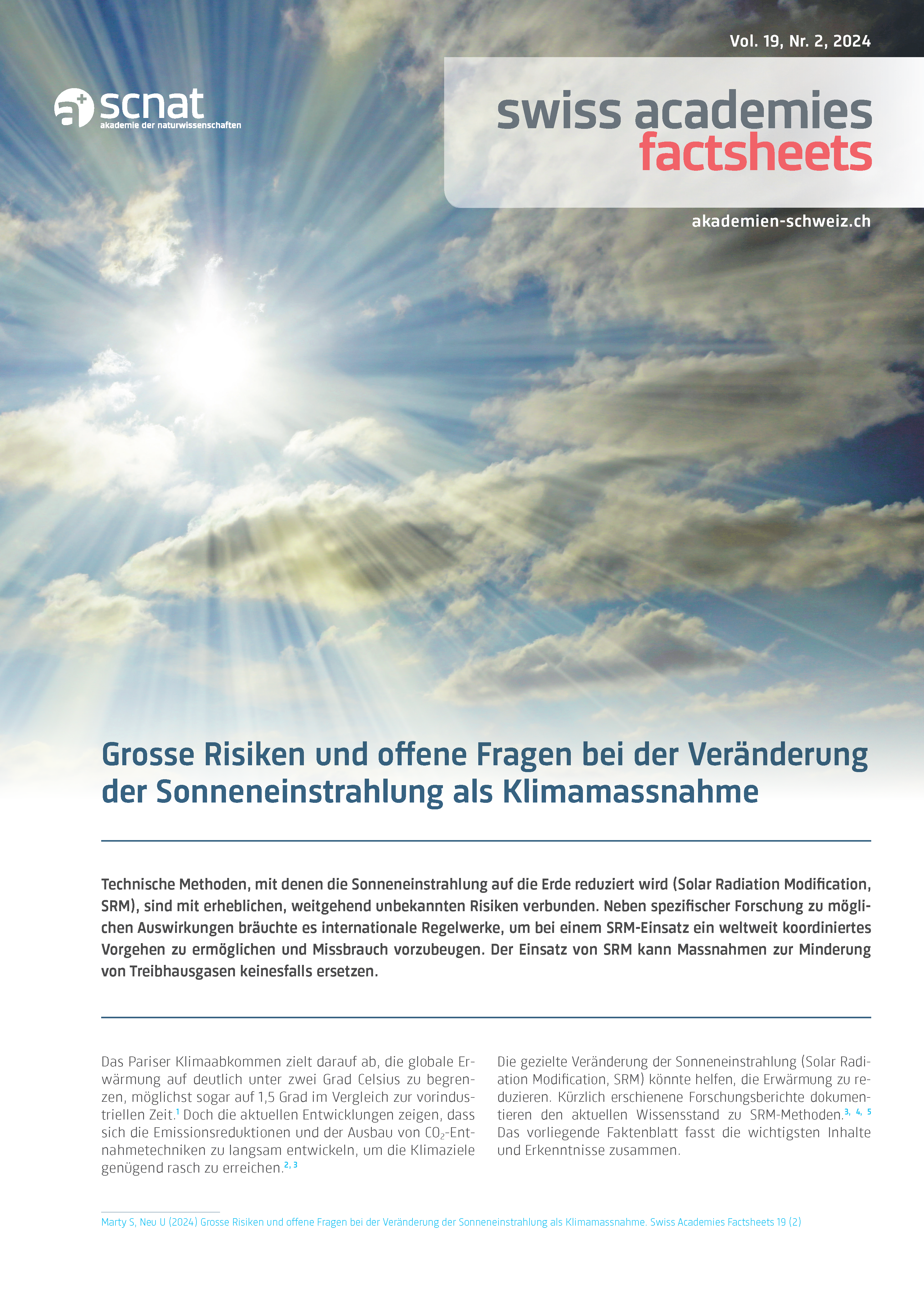
Technische Methoden, mit denen die Sonneneinstrahlung auf die Erde reduziert wird (Solar Radiation Modification, SRM), sind mit erheblichen, weitgehend unbekannten Risiken verbunden. Neben spezifischer Forschung zu möglichen Auswirkungen bräuchte es internationale Regelwerke, um bei einem SRM-Einsatz ein weltweit koordiniertes Vorgehen zu ermöglichen und Missbrauch vorzubeugen. Der Einsatz von SRM kann Massnahmen zur Minderung von Treibhausgasen keinesfalls ersetzen.
Marty S, Neu U et al. (2024) Grosse Risiken und offene Fragen bei der Veränderung der Sonneneinstrahlung als Klimamassnahme. Swiss Academies Factsheets 19 (2)
MINT Svizzera – Panoramica dei progetti finanziati 2021 - 2024
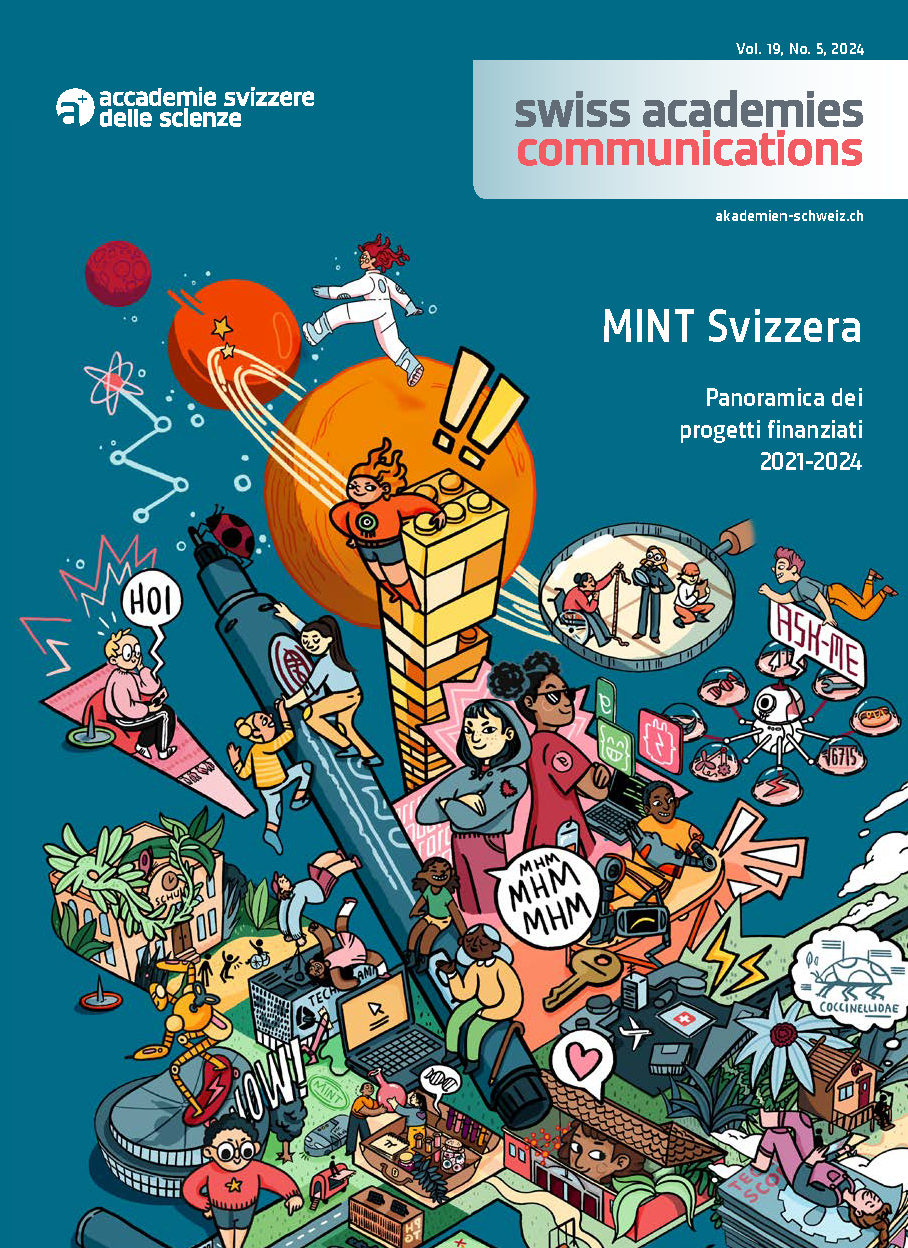
Accademie svizzere delle scienze (2024)
MINT Svizzera – Panoramica dei progetti finanziati 2021 - 2024. Swiss Academies Communications 19 (5).
Citizen Science in Switzerland: Taking Stock and Ways into the Future
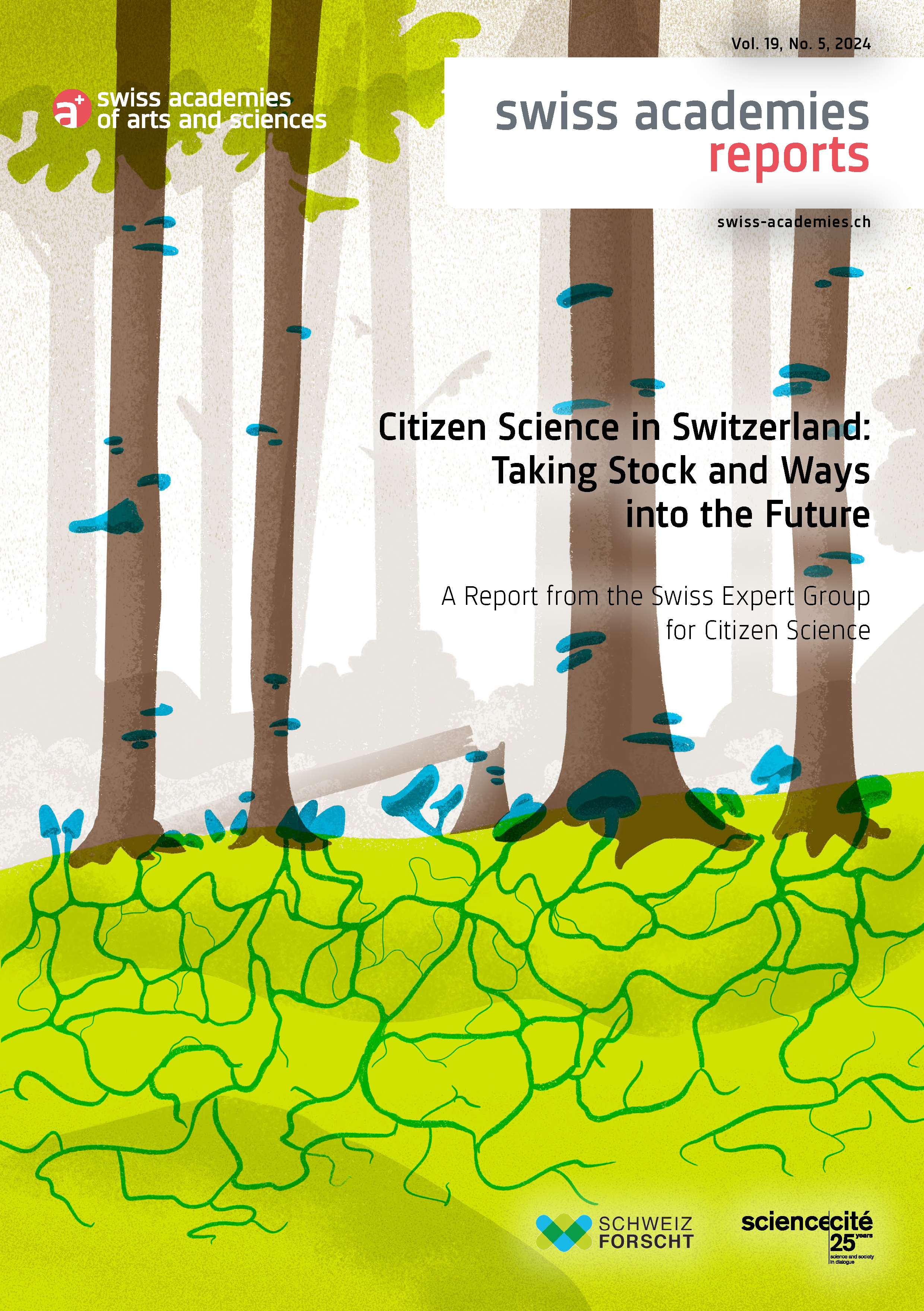
In den letzten Jahren hat sich das Verhältnis zwischen Wissenschaft und Gesellschaft stark verändert. So ist Citizen Science in den Fokus gerückt und konnte sich dynamisch entwickeln und ausbreiten, auch in der Schweiz. Der vorliegende Bericht der Schweizer Expert:innengruppe für Citizen Science wurde partizipativ und mit Feedback aus der Community erarbeitet. Die Publikation stellt zum einen die vielfältigen und zahlreichen Initiativen, Projekte und Tools rund um Citizen Science in der Schweiz vor. Zum anderen werden Ziele und Massnahmen für verschiedene Akteure zu den vier Themen Mehrwert und Wirkung, Finanzierung, Ausbildung sowie Kommunikation und Sichtbarkeit formuliert.
Swiss Expert Group for Citizen Science (2024). Citizen Science in Switzerland: Taking Stock and Ways into
the Future. Swiss Academies Report: 19 (5)
Diversità degli insetti in Svizzera: Importanza, tendenze, possibili azioni
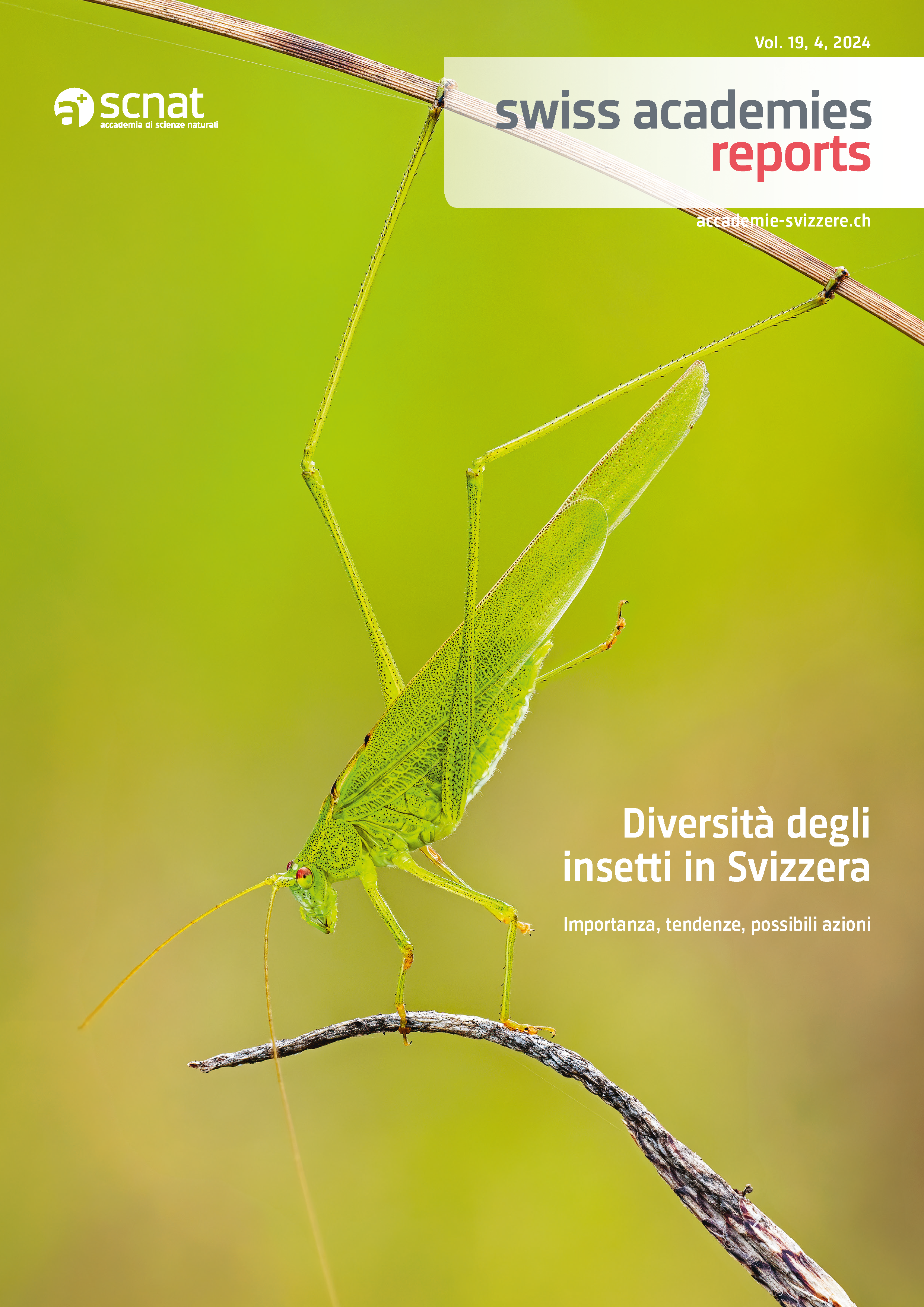
La situazione degli insetti in Svizzera è preoccupante, scrivono i ricercatori e le ricercatrici nel primo rapporto completo sullo stato di salute "Diversità degli insetti in Svizzera", pubblicato dal Forum sulla biodiversità dell'Accademia svizzera delle scienze. I ricercatori e le ricercatrici hanno analizzato i dati disponibili provenienti dalle Liste Rosse, dai programmi di monitoraggio e dagli studi. Secondo il rapporto, la diversità e le dimensioni delle popolazioni di insetti sono fortemente diminuite, in particolare sull'Altopiano centrale, ma ora anche nel Giura e nelle Alpi. Gli autori e le autrici propongono il "Programma insetti in 12 punti", scientificamente fondato, per arrestare questa evoluzione a volte drammatica. La presente traduzione italiana è solo un estratto del rapporto originale "Insektenvielfalt in der Schweiz: Bedeutung, Trends, Handlungsoptionen" o della corrispondente traduzione francese "Diversité des insectes en Suisse : Importance, tendances, actions possibles".
Widmer I, Mühlethaler R et al. (2024) Diversità degli insetti in Svizzera: Importanza, tendenze, possibili azioni. Swiss Academies Reports 19 (4)
Nationales Forschungsprogramm Klima 2024 plus
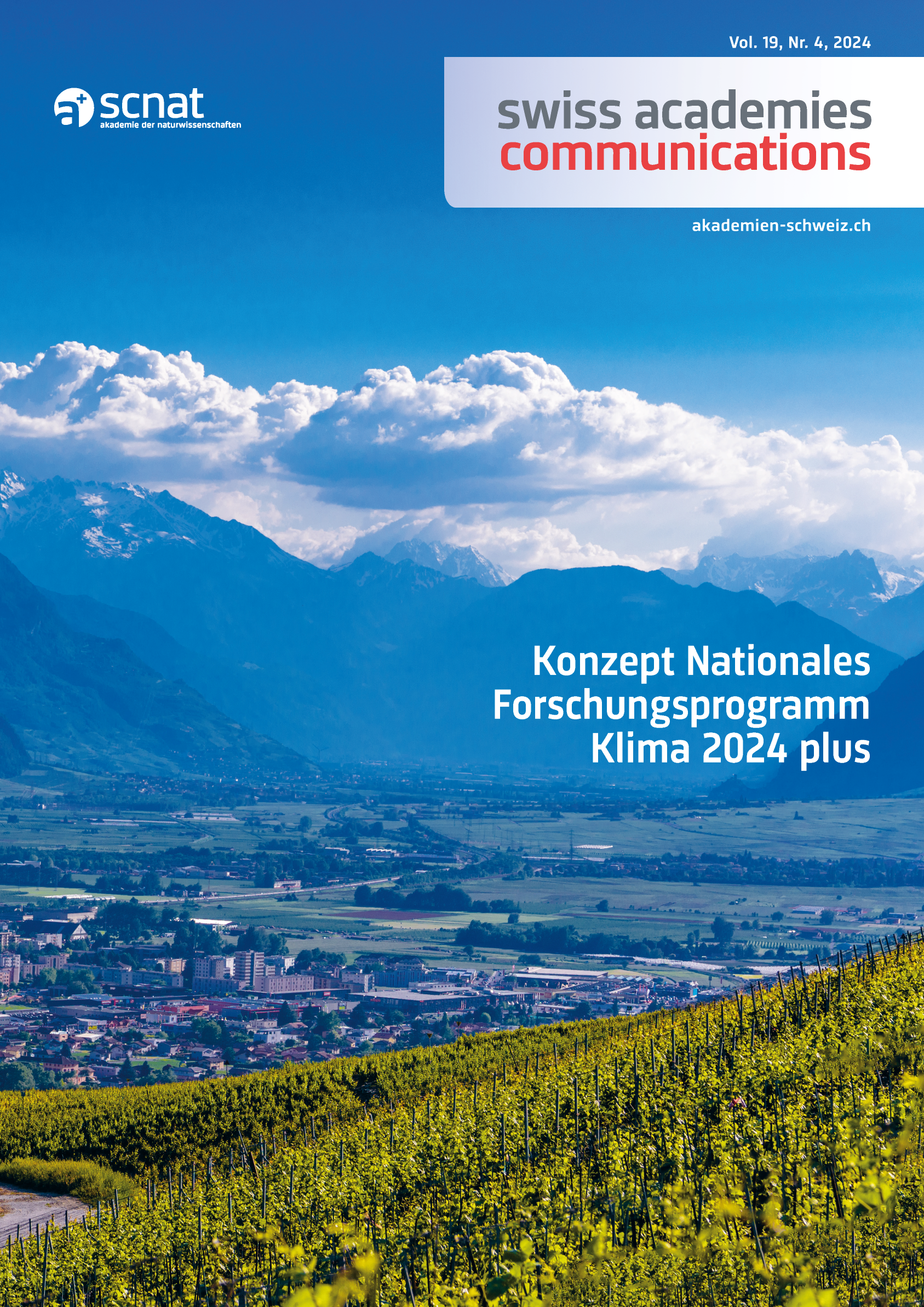
Die zur Erreichung der Klimaziele notwendige Transformation stellt eine enorme technische, politische und sozioökonomische Herausforderung dar, bietet aber auch Chancen. Während die Umgestaltung der Energieversorgung in der Schweiz bereits in verschiedenen Forschungsprogrammen beleuchtet wurde, fehlte dies für Fragen zur gesellschaftlichen Transformation. Die Publikation bietet nun eine Übersicht über bestehende Fragen und Forschungslücken und skizziert ein Konzept für ein entsprechendes Forschungsprogramm.
Ingold K, Lechthaler F, Müller G, Neu U (2024) Nationales Forschungsprogramm Klima 2024 plus. Swiss Academies Communications 19 (4)
The role of critical materials for the energy transition: Challenges and opportunities
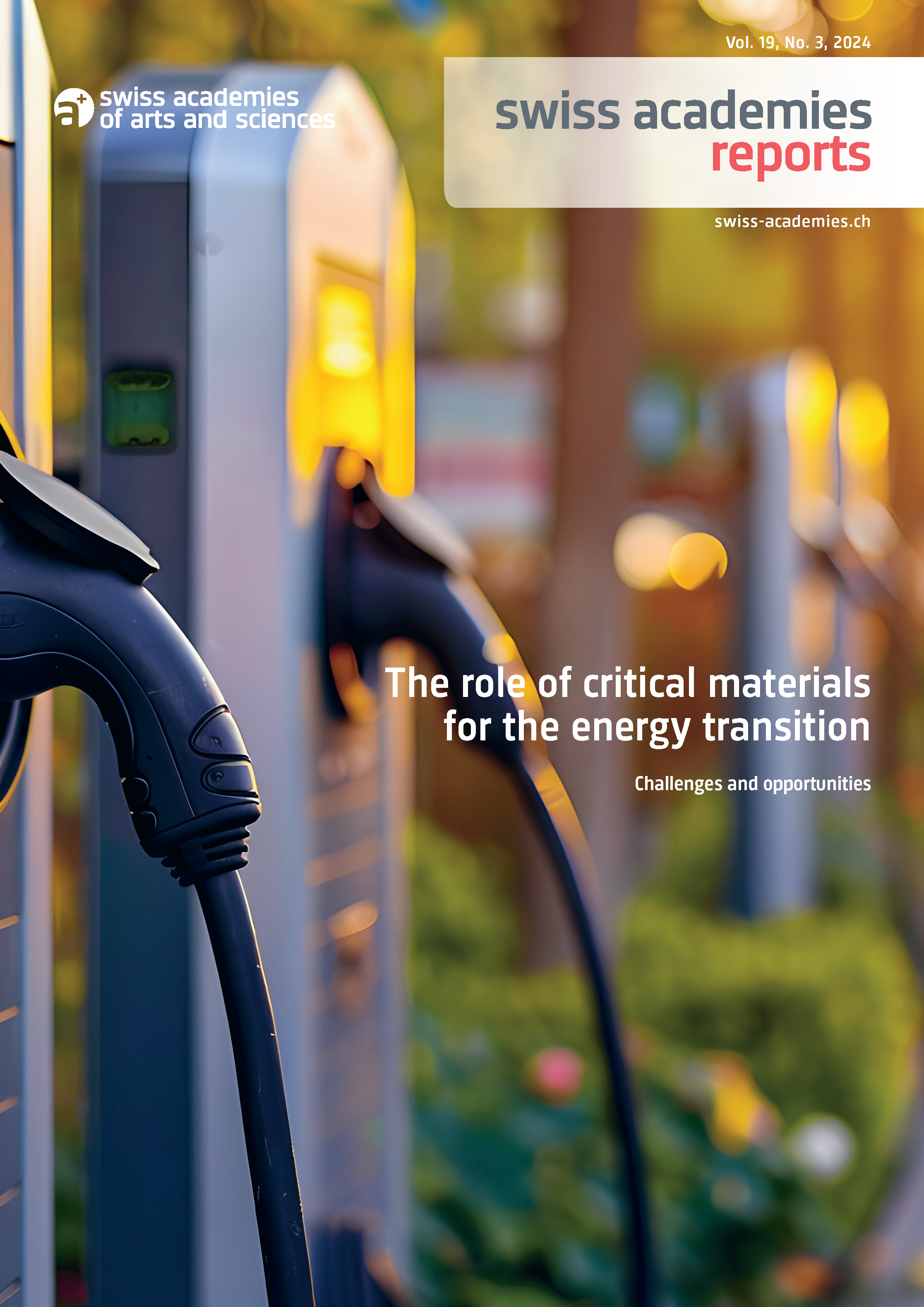
This report summarizes current concerns from experts on increasing risks in the international supply of critical materials for the energy transition, discusses potential implications, challenges and opportunities and makes recommendations for Switzerland.
Noailly et al. (2024)
The role of critical materials for the energy transition. Challenges and opportunities.
Swiss Academies Reports 19 (3)
Auf der Erfolgsspur: RNA-Technologien in der Medizin und der Landwirtschaft
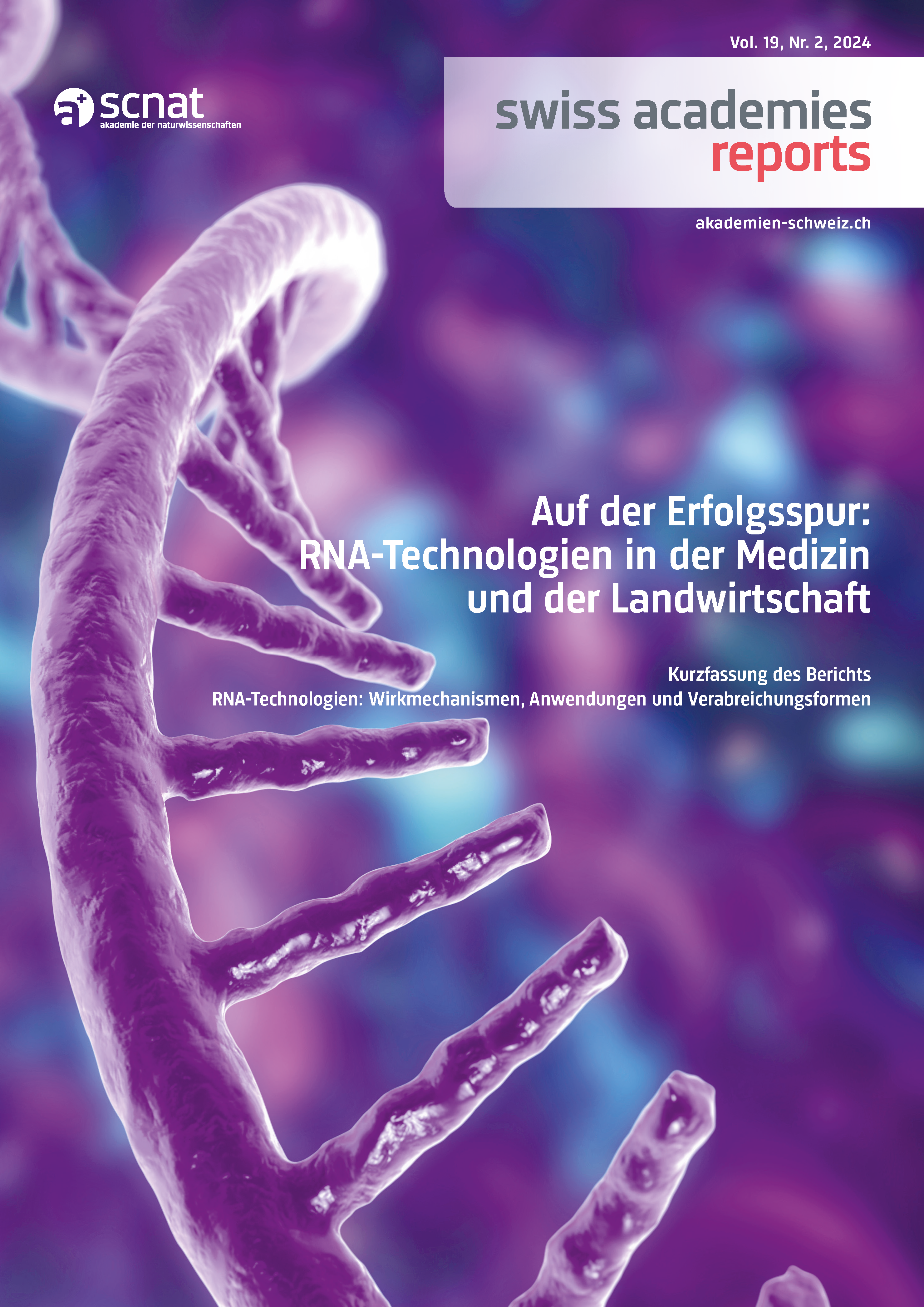
Kurzfassung des Berichts RNA-Technologien: Wirkmechanismen, Anwendungen und Verabreichungsformen
mRNAs sind seit ihrem Einsatz in Covid-19-Impfungen fast allen ein Begriff. Das Potential von RNA-basierten Wirkstoffen ist damit aber längst noch nicht ausgeschöpft. Neben Impfstoffen gegen andere ansteckende Krankheiten werden etwa Therapien für verschiedene Krebsarten und Erbkrankheiten entwickelt und sogar für den Pflanzenschutz werden RNAs verwendet.
Kümin M (2024) Auf der Erfolgsspur: RNA-Technologien in der Medizin und der Landwirtschaft. Swiss Academies Reports 19 (2)
Space Research in Switzerland 2022–2024
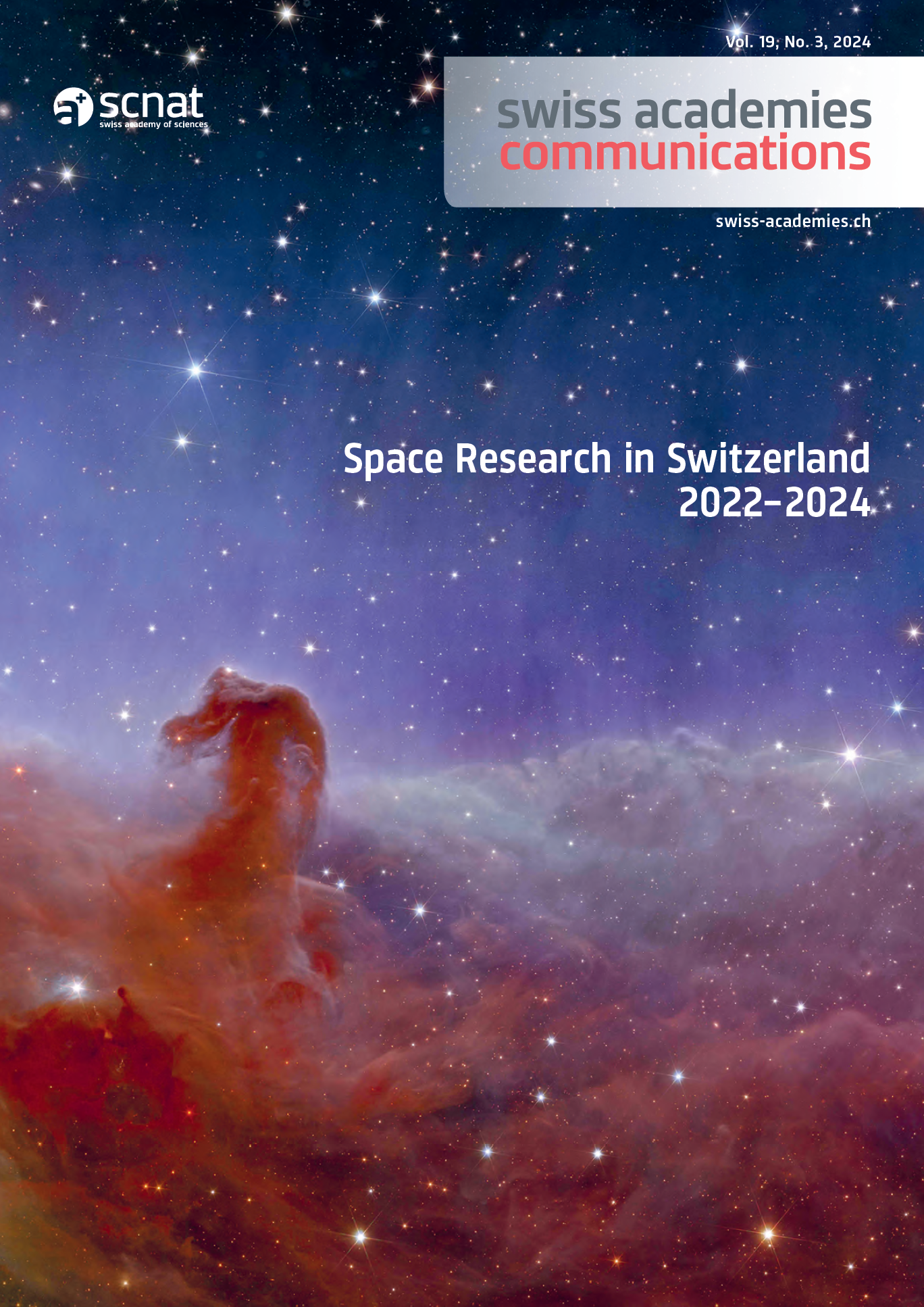
The present report is a compilation of the projects that have been conducted in Swiss research institutes in the field of space research over the period 2022–2024. It was unveiled by the Swiss Committee on Space Research (CSR) ahead of the 45th COSPAR Scientific Assembly in Busan, South Korea.
S Paltani, S Nyeki (2024)
Space Research in Switzerland 2022–2024
Swiss Academies Communications 19 (3)
La science, un droit de l’Homme ?
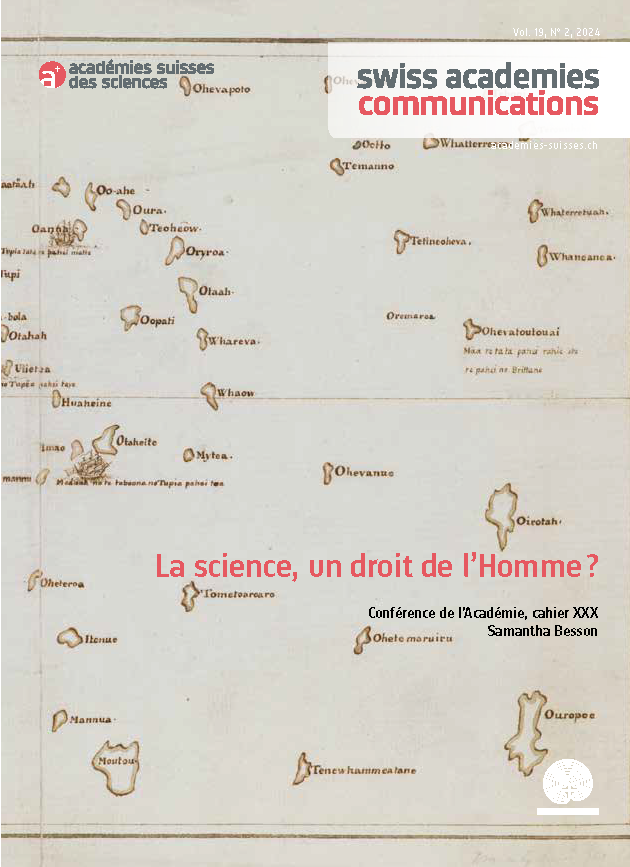
In diesem Akademiereferat stellt Samantha Besson ihre neuesten Arbeiten zur Theorie der Menschenrechte vor, insbesondere zum Recht jeder und jedes Einzelnen, an der Wissenschaft teilzuhaben und von ihren Anwendungen zu profitieren. Sie hinterfragt das sogenannte Menschenrecht auf Wissenschaft und stellt vier Fragen: Ist ein solches Recht im Völkerrecht vorhanden? Wird es in der Praxis eingehalten? Kann es ein Recht auf Wissenschaft geben? Und ist Letzteres als Menschenrecht zu betrachten? Damit leistet die Autorin einen Beitrag zu den Bemühungen, den Inhalt und die Identität der Inhaber und Schuldner dieses Rechtes konzeptuell und normativ zu klären. Diese Anstrengungen stellen notwendige Schritte für die Wiederbelebung dieses Rechtes in der zeitgenössischen Praxis des internationalen Menschenrechtsschutzes dar.
Besson, Samantha (2024) : La science, un droit de l’Homme ?, éd. par l’ASSH (Conférence de l’Académie XXX / Swiss Academies Communications 19,2).
Pollen allergy and the impact of a changing climate
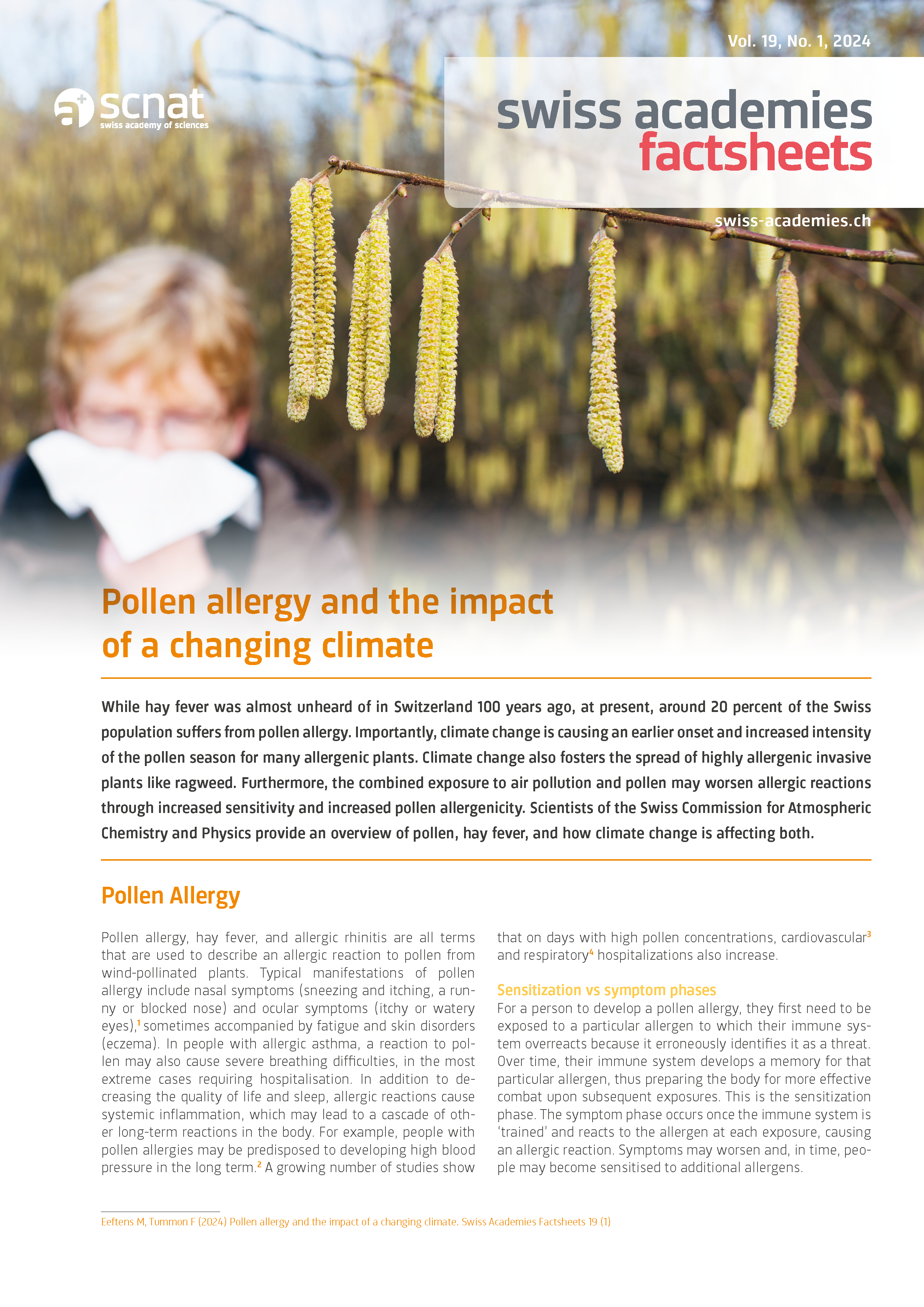
While hay fever was almost unheard of in Switzerland 100 years ago, at present, around 20 percent of the Swiss population suffers from pollen allergy. Importantly, climate change is causing an earlier onset and increased intensity of the pollen season for many allergenic plants. Climate change also fosters the spread of highly allergenic invasive plants like ragweed. Furthermore, the combined exposure to air pollution and pollen may worsen allergic reactions through increased sensitivity and increased pollen allergenicity. Scientists of the Swiss Commission for Atmospheric Chemistry and Physics provide an overview of pollen, hay fever, and how climate change is affecting both.
Eeftens M, Tummon F (2024) Pollen allergy and the impact of a changing climate. Swiss Academies Factsheets 19 (1)
RNA-Technologien: Wirkmechanismen, Anwendungen und Verabreichungsformen
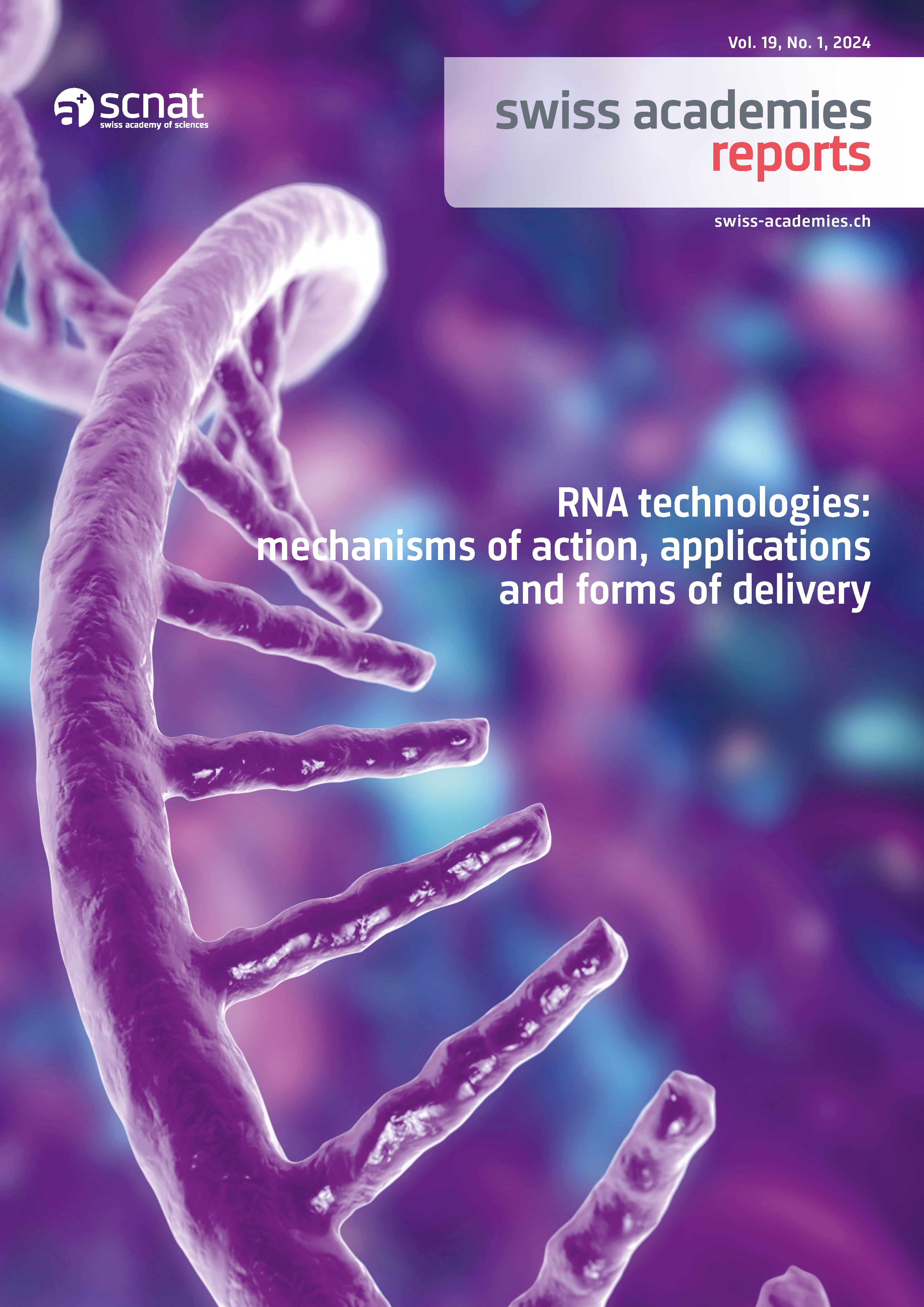
The aim of this report is to provide a technical and scientific overview of the various currently relevant RNA technologies. It provides information on the mechanisms of action of the various RNA-based approaches, their fields of application and products and their development status. The report is intended to help assess and discuss the benefits, risks and limitations of the various RNA technologies and their products. It is also intended to support the legal categorisation of RNA products.
Kümin M, Eyer K, Hall J, Koch A, Pascolo S, Romeis J (2024)
RNA technologies: mechanisms of action, applications and forms of delivery.
Swiss Academies Reports 19 (1)
Ausbau erneuerbarer Energien biodiversitäts- und landschaftsverträglich planen
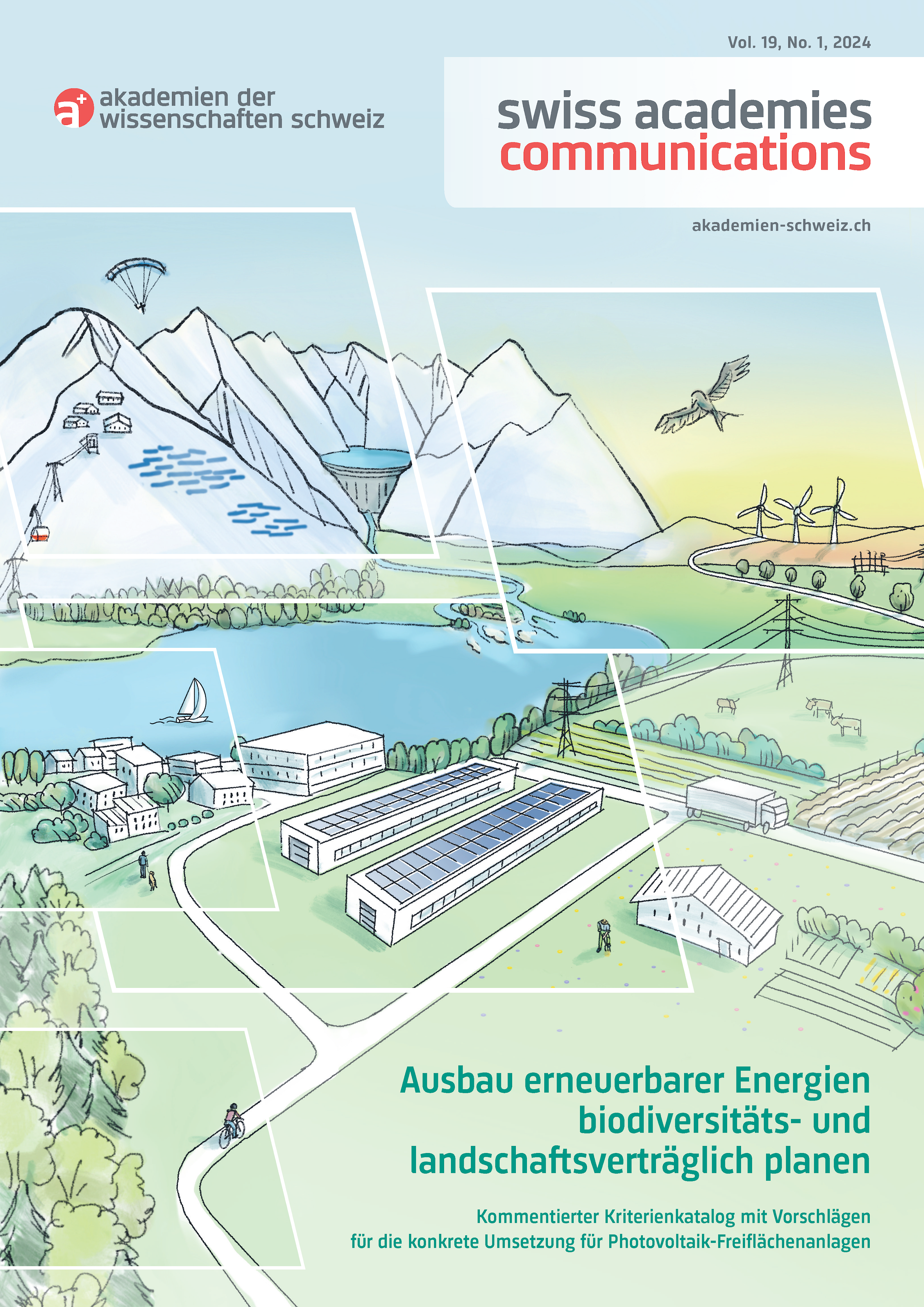
Kommentierter Kriterienkatalog mit Vorschlägen für die konkrete Umsetzung für Photovoltaik-Freiflächenanlagen
Die Akademien der Wissenschaften Schweiz haben gemeinsam mit Fachleuten Kriterien entwickelt, um geeignete Gebiete zum Bau von Energieanlagen ausserhalb von Bauzonen zu finden, die Biodiversität und Landschaft möglichst wenig beeinträchtigen. Die Kriterien können Kantone bei der Richtplanung und Energieversorger bei der Planung von Solar-, Wind- und Wasserkraftanlagen unterstützen.
Neu U, Ismail S, Reusser L (2024)
Ausbau erneuerbarer Energien biodiversitäts- und landschaftsverträglich planen.
Swiss Academies Communications 19 (1)
Swiss Academies of Arts and Sciences
House of Academies
Laupenstrasse 7
P.O. Box
3001 Bern
Switzerland